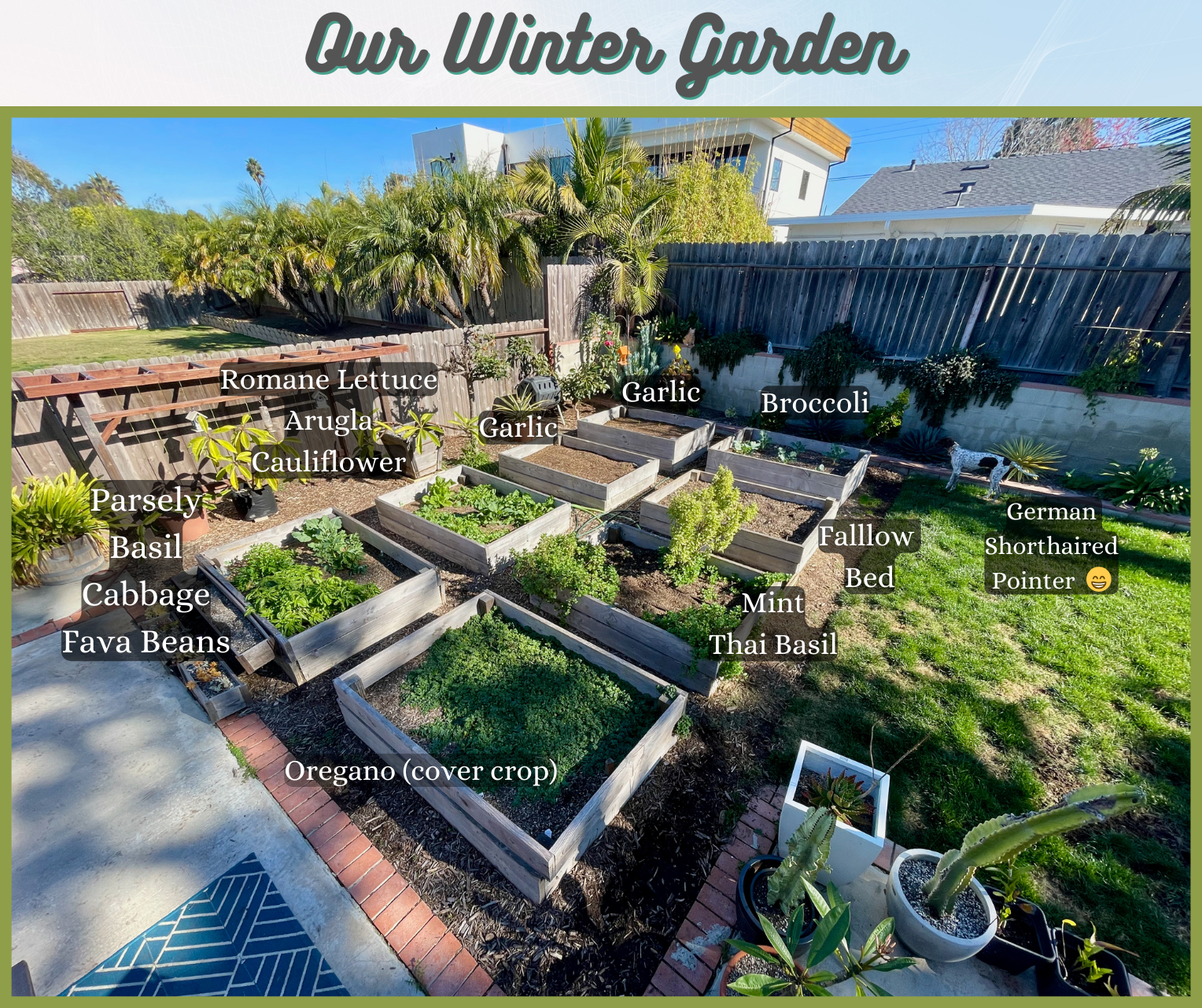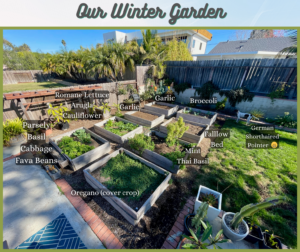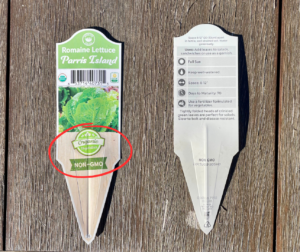
Eating organic food has long been a topic of discussion here on our blog. We’ve advocated for the practice for years. Today, I want to do a deeper dive on the benefits of organic produce and encourage you to try growing your own. Convenience and cost may be valid concerns, but the choice between organic and non-organic vegetables can have a significant impact on your health and the environment.
Why Organic Vegetables Rise Above:
- Lower Pesticide Exposure: Organic farming practices strictly prohibit the use of synthetic pesticides and herbicides, minimizing your exposure to these potentially harmful chemicals. This is particularly important for children and pregnant women who are more vulnerable to their effects. Studies have linked long-term exposure to pesticides with various health problems, including cancer, neurological disorders, and reproductive issues. (1) Children are particularly vulnerable to the effects of pesticides, as their bodies are still developing and their detoxification systems are not fully mature. Pregnant women are also at risk, as pesticides can cross the placenta and harm the developing fetus. While the Environmental Protection Agency (EPA) sets standards for pesticide residues on food, these standards are not always protective enough. Additionally, even low levels of pesticide exposure can be harmful, especially over time.
- Improved Nutrition: Studies have shown that organic vegetables can contain higher levels of certain nutrients, including antioxidants and vitamins. This is likely due to the natural methods used in organic farming, which promote soil health and plant diversity. (2)
- Enhanced Flavor: Many people find that organic vegetables have a richer, more intense flavor than non-organic options. This is likely due to the fact that organically grown plants are not stressed by pesticides or herbicides, allowing them to develop their natural flavors more fully. While this is anecdotal, I can attest to it. When we buy from the local Farmer’s Market, or grow our own produce, the taste is noticeably better.
- Lower Environmental Impact: Organic farming practices are better for the environment. They help to conserve water, reduce soil erosion, and promote biodiversity. Additionally, organic farms do not contribute to the pollution of waterways with agricultural runoff.

A quick view of what organic vegetables we are growing in Winter 2023
Try Growing Your Own Organic Vegetables
Taking the step to grow your own vegetables is a rewarding experience that offers numerous benefits:
- Control over the Process: You have complete control over the growing process, from seed selection to harvest. This means you can be confident that your vegetables are free from harmful chemicals and are grown according to your own standards.
- Fresher Taste: Homegrown vegetables are often picked at the peak of ripeness, resulting in a superior flavor and texture compared to store-bought produce. Additionally, they likely go from your garden, straight into your meal. This reduces the time they spend in trucks, on shelves, in the hands of other people and generally ensures they are eaten at their very freshest.
- A Connection to Nature: Gardening provides a wonderful opportunity to connect with nature and learn about the food we eat. It can be a therapeutic and rewarding experience for people of all ages. Personally, this is one of my favorite parts of the process. I start my day with a cup of coffee, while walking barefoot in the garden checking on whatever crops we have growing at the time.
- Saving Money: Growing your own vegetables can save you money on your grocery bill. While organic produce can be expensive, the cost of seeds and supplies is often lower, and the yield from your garden can provide you with fresh vegetables for months to come.
Getting Started with Organic Gardening:
If you’re interested in growing your own organic vegetables, here are a few tips to get you started:
- Choose a sunny location: Most vegetables need at least 6-8 hours of sunlight per day. However, if it is very hot, things like herbs and lettuces will quickly “bolt”. This means that they are flowering to reproduce because they fear the end is near. Pinch or cut off the flower stalk as quickly as you can. Flowering tends to make foods bitter.
- Prepare your soil: Test your soil and add amendments as needed to create a healthy growing environment. Use a quality organic planting soil amended with compost and don’t overthink it. Your goal is simply to create a depth of biodiversity.
- Select the right plants: Choose vegetables that you love, that thrive in your climate and are easy to grow for beginners. Understanding the seasons and your climate is key. You can likely find very helpful gardening groups on Facebook, like the one we have here in San Diego, which is run by local Master Gardeners. The USDA has released a new Plant Hardiness Zone Map that is very helpful. All you have to do is enter your Zip Code and it will tell you your zone. Be sure to look for “Organic” and “Non-GMO” on the seeds or plants you buy, and follow the instructions on the plant tag.

Always look for “organic” and “non-GMO” on plant tags.
- Water regularly: Water your plants deeply and regularly, especially during hot and dry periods. A drip irrigation system on a timer is by far the best, but you can hand water and consider lower cost options like a garden hose attached to sprayers on an automated timer.
- Control pests and diseases: There are many organic methods for controlling pests and diseases, such as using beneficial insects and handpicking pests. One of the best things you can do is attract birds with feeders and shelters. The birds will do a lot of the work for you. Yes, they may take a little fruit as payment, but it is a good trade off. We just put out bird food for them and they do most of the work. As a general matter, if you keep your soil healthy and encourage biodiversity in your garden, no organism will grow out of balance and you’ll have less issues.
Growing your own food can be a fun and rewarding experience, and it’s a great way to ensure that you and your family are eating fresh, organic vegetables. By choosing organic options, both in your own garden and at the grocery store, you are making a positive impact on your health and the environment. So, why not embrace the earth-friendly feast and enjoy the benefits of organic vegetables today?
CITATIONS
1. Title: Chemical Pesticides and Human Health: The Urgent Need for a New Concept in Agriculture
Authors: Benbrook CM, Hillocks RJ, Bellinder RR, Gilliland FD, Morse JG, Seshadri K, Steinemann AC, VanDerLaan PA, Weisenburger DD
Journal: Frontiers in Public Health
Year: 2016
Link: https://pubmed.ncbi.nlm.nih.gov/27486573/
This study provides a comprehensive review of the scientific literature on the health effects of chemical pesticides. The authors conclude that there is strong evidence linking long-term exposure to pesticides with a variety of health problems, including:
Cancer: Several studies have linked pesticide exposure to an increased risk of cancer, including leukemia, lymphoma, and brain cancer.
Neurological disorders: Exposure to pesticides has been linked to an increased risk of Parkinson’s disease, Alzheimer’s disease, and other neurological disorders.
Reproductive issues: Pesticides have been shown to interfere with the endocrine system and can disrupt reproductive function. This can lead to problems such as infertility, miscarriage, and birth defects.
The study also highlights the need for further research on the health effects of pesticides, particularly in vulnerable populations such as children and pregnant women.
2. Title: Higher antioxidant and lower cadmium concentrations and lower incidence of pesticide residues in organically grown crops: a systematic literature review and meta-analyses
Authors: Baranski M, Srednicka-Tober D, Volakakis N, Seal CJ, Sanderson R, Stewart G, Benbrook CM, Biavati B, Markellou E, Giotis C, Gromadzka-Ostrowska J, Rembialkowska E, Skwarło-Sońta K, Tahvonen J, Juntunen K, Niggli U, Leifert C
Journal: Environmental Science and Pollution Research International
Year: 2014
Link: https://pubmed.ncbi.nlm.nih.gov/24968103/
This study is a meta-analysis of 343 peer-reviewed studies comparing the nutrient content of organically and conventionally grown crops. The authors found that organic vegetables contained significantly higher concentrations of antioxidants and certain vitamins, including:
Antioxidants: Organic vegetables were found to have 18% higher levels of antioxidants, on average.
Vitamin C: Organic vegetables were found to have 28% higher levels of vitamin C, on average.
Iron: Organic vegetables were found to have 29% higher levels of iron, on average.
Magnesium: Organic vegetables were found to have 27% higher levels of magnesium, on average.
Phosphorus: Organic vegetables were found to have 14% higher levels of phosphorus, on average.




